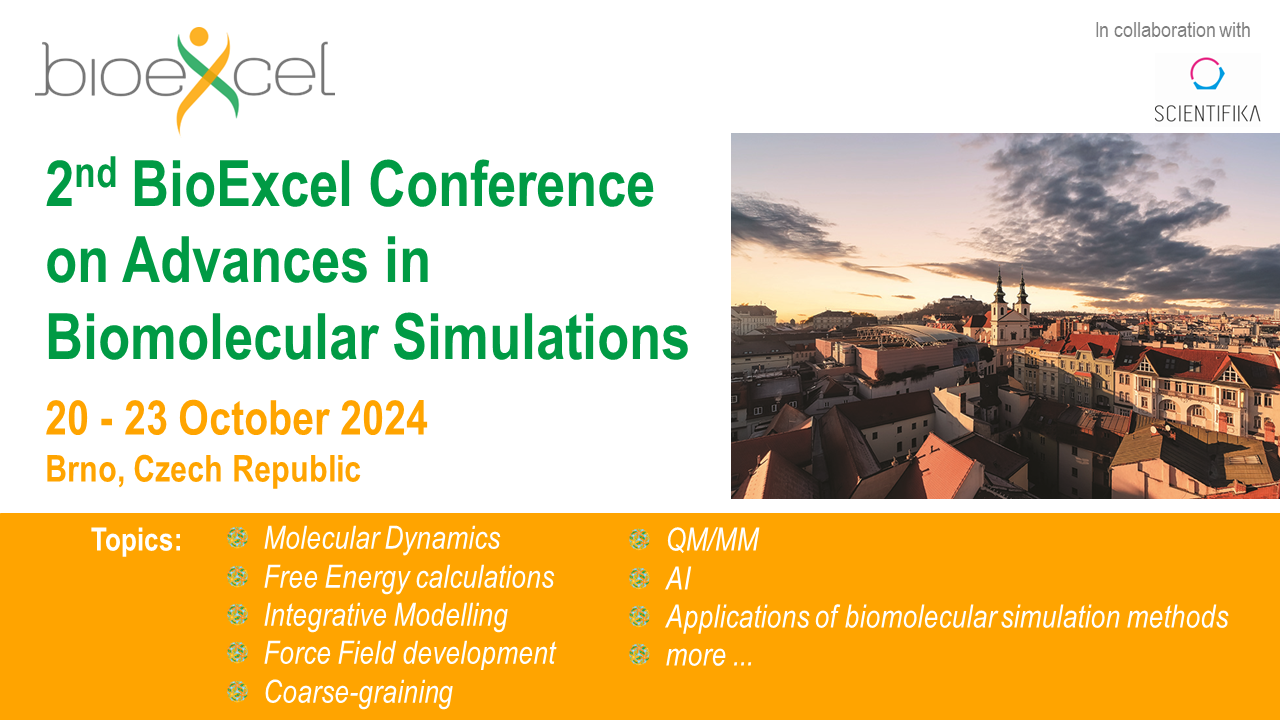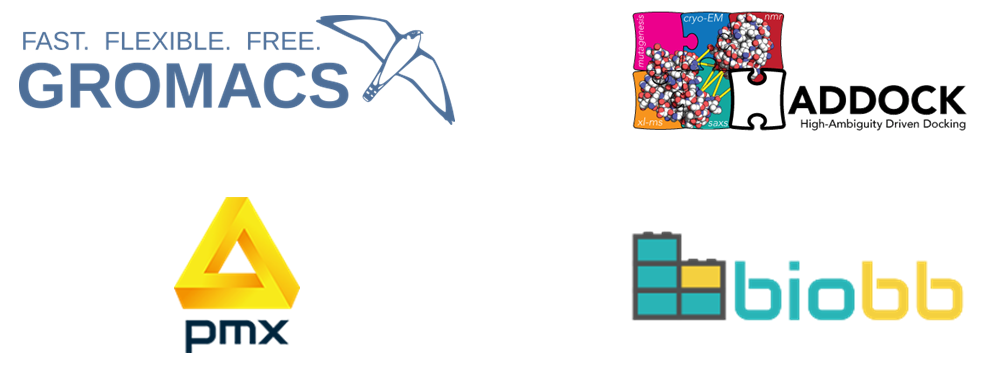|
|
|
|
Please take the opportunity to provide us with you feedback through our annual BioExcel survey. Our program for the upcoming BioExcel Conference on Advances in Biomolecular Simulations has been finalised and you can still register and submit your poster abstracts. As always we provide you with an update of our recent software development work and highlight upcoming webinars, news and job posts.
|
|
|
|
|
|

|
The BioExcel survey 2024 will remain open until mid-September
|
Our annual survey is your chance to tell us what you like about BioExcel and what could be improved. From influencing the development of our four core software codes (GROMACS, HADDOCK, PMX, BioBB) to training, support and community engagement. We really value your views so are leaving the survey open until mid-September and it should only take you about 15 minutes to complete. Thank you!
|
|
|
|
|
|

|
Second BioExcel Conference: register and submit your poster abstract
|
The final program for oral presentations for our conference on Advances in Biomolecular Simulations is now available through our website. We are still accepting registrations and abstracts for poster presentations until 30 September 2024. Don't miss out on what promises to be a truly inspiring event! Information on registration and abstract submission.
|
|
|
|

|
BioExcel core software development updates
|
In this section we provide a short update on some of the recent work carried out on our core software applications. This work is based on the priorities which emerged from the 2023 user surveys and is reflected in our software development dashboard.
|
|
|
|
|
The end of August will see the minor release of GROMACS 2024.3. In September the developers are involved in the second edition of the workshop: Learn to code in GROMACS. The workshop will be held online and the lectures will be recorded and posted on the BioExcel YouTube channel. The developers are working hard to bring requested features into the 2025 release. As always, you are welcome to the user forum if you need help with your simulations and if you are interested in the development, you can also join our bi-weekly calls on Wednesdays (see here for more details).
|
|
|
|
|
The team is actively working on the first production release of HADDOCK3, polishing the various modules, writing a user manual and new tutorials, all following the defined development roadmap. From the previously identified priorities, two are completed. The first is a summary/visualisation of intermolecular interactions, available as a HADDOCK3 module (contactmap), which provides a list of contacts as tsv files, and visualisation as interactive contact heatmaps and chord charts. The second is an improved analysis report, with the automatic analysis of a run providing detailed html views of the results (cluster statistics, visualisation of best models) and various plots to analyse the distribution of scores, energy terms and RMSDs. Also under this development priority falls the improved clustering modules (clustfcc and clustrmsd), where a visual representation of the distance matrix used to cluster is now made available as interactive plots, allowing to get a better understanding of the dispersion of the model conformations as well as providing hints to fine tune the clustering parameters.
|
|
The HADDOCK web service was migrated to a new server at the end of June. The backend of the server is now running the Python3 version of HADDOCK, HADDOCK2.5, which has exactly the same functionalities as the old 2.4 version. This upgrade does not bring any changes for end users.
|
|
|
|
|
|
|
|
|
The BioBB team is working on the next release of the BioBB library with new modules under development, including AlphaFold-related structure conformation generation, MD feature extraction and pattern recognition using PyTorch autoencoders, and enhanced sampling methods using GROMACS. If you have any questions related to BioBB please post these in the user forum.
|
|
|
|
|
|
Webinar series: PDBe resources to help with model selection
|
In our first webinar of the ongoing series following the summer break we are pleased to welcome Sudakshina Ganguly from the PDBe who will talk about the tools and resources available to assist users in searching for, finding, and evaluating the quality of their structure of interest. Familiarity with these tools and resources can help with setting up a robust and relevant molecular system for MD simulations. Register here.
|
|
|
|
Report: Summer School 2024 post published
|
Our Summer School on Biomolecular Simulations is now in its 7th year and is one of the highlights for us and for the 30 participant who are selected to attend. In this year's report we highlight the value which the community-building aspects of the event bring to participants.
|
|
|
|
Job opening: Research Engineer at the BSC
|
If you are interested in joining the team at the Barcelona Supercomputing Center working in software development and deployment as part of the BioExcel and MDDB projects there is an opening for you. You can find further information about the role here.
|
|
|
|
Advocating for FAIR principles in biomolecular simulations
|
Authored by over 100 experts in the field and including key participation from BioExcel this soon to be published letter highlights the need and commitment to apply FAIR principles to Molecular Dynamics data.
|
|
|
|
Request: please acknowledge BioExcel support
|
We are passionate about providing high quality support to users of our codes and have done so for many years. We have a small favour to ask those who have received this support and read this message.
|
|
Please take a moment to acknowledge the BioExcel Centre of Excellence as part of your dissemination through journals, presentations or other forms of communication. It would mean the world to us! Further, we would be delighted if you could drop us a quick email at team@bioexcel.eu to let us know how we have helped you. Thank you for your continued support!
|
|
|
|
|
|
|
|
We handle your data responsibly and we don't share it with third parties. Find out more about our Privacy Policy. You may unsubscribe at any time but we hope you will stay in touch.
|
|
|
|